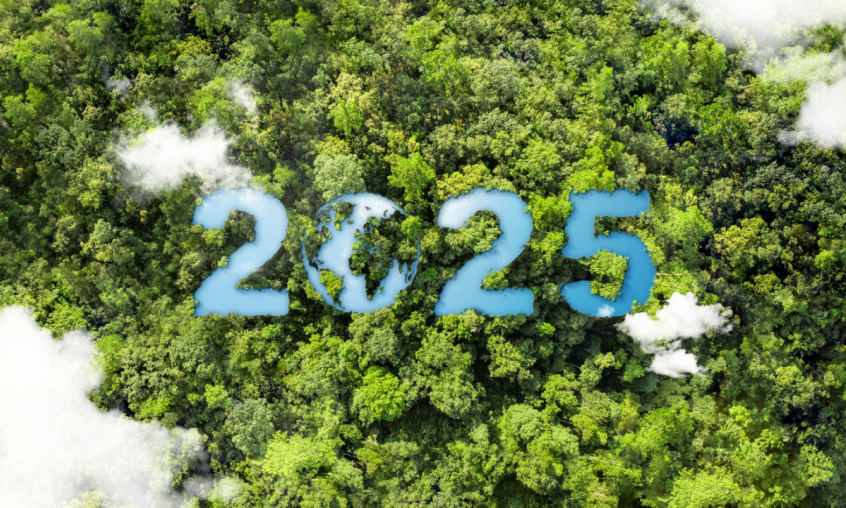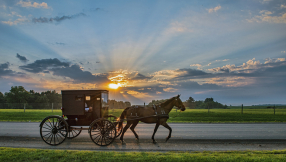
It is a very brave/naïve/foolish person (select as applicable) who makes confident and precise predictions about what will happen in the next year. However, buoyed up by my recent track record – looking into the 2020s and predicting that SARS-CoV-2 coronavirus (aka COVID-19) will be a serious issue in China, may spread into south-east Asia, but will not develop into a global pandemic, and Putin is a posturing bully who will not launch a full-scale invasion of Ukraine – I make my predictions for 2025!
Climate
First, the (depressingly) easy one. More global warming records will occur, as the planet continues its human-caused upward climb regarding global heating. More ice will melt at the poles and life will become even more precarious for animals there, especially polar bears in the arctic.
Weather will continue to be erratic and unpredictable, with severe events causing flooding and disruption. The daffodils in my garden will continue the (now regular) appearance of full flowers in mid-December and certainly well in time for Christmas. The confused garden primroses will continue their recent habit of multiple flowerings over the year and there will be few redwings feeding on the winter berries, due to their ability to now over-winter in ever-increasing numbers on the (warmer) continent.
Climate change deniers will continue to say it's all a hoax or wildly exaggerated. Others will continue to argue that net zero goals must be slowed due to their threat to our fuel security/living standards/national way of life (select as applicable). The US will withdraw from vital climate change commitments, while trying to ignore the crises that worsening extremes of weather visit on it (as on the rest of us).
On the other hand, there will be advances in sustainable technologies and carbon capture. So, there will be encouragements, as well as anxiety-causing factors, in this key area of modern life. But time is short for action.
AI and the information revolution
While AI is unlikely to see the world fall apart (as its more apocalyptic critics suggest), its impact will continue to accelerate. OpenAI's 'ChatGPT' (already with over 300 million weekly users in 2024) points the way towards how this information revolution will continue to grow in use and influence.
The algorithms will continue to polarise online information and accelerate the divisiveness of digital discourse. More elections will be tampered with by the enemies of democracy. The 'mainline' legacy media will continue to see its influence fall as more people seek their news and views from more tailored sources / prefer information that confirms existing biases / opt for soundbites of dubious provenance over researched and attributable news (select whichever description most accords with your outlook!).
But it will not just be the bringer of digital Armageddon. Expect to see large advances in its use in medical analysis of data and other areas of complex information analysis. Google's 'DeepMind' has already won the Nobel Prize for Chemistry for its contributions to understanding protein-folding, using its AI model 'AlphaFold 2'. Expect more of this and do not assume that human civilisation is about to implode in an 'AI-generated' catastrophe.
Watch as millions more users of X (once called Twitter) move to Threads, BlueSky and other social media, in protest at Elon Mark's openly rightward trajectory on 'X'. A digital migration event is under way!
Like the invention of the printing press in the 15th century, and the worldwide web in the 20th and 21st centuries, AI will continue to open the door into both good and ill. The key thing is: it will not go away.
The migrant crisis
Another predictable one. Expect to see a continuation of the movement of both undocumented economic migrants, and also asylum seekers, into Europe and the UK at the same time as Western governments fail to persuade their populations that a large influx of skilled and suitably qualified young workers from abroad is necessary to support the care needs of an aging population and plug gaps in the workforce.
In the middle of this conundrum, expect the continued upward trajectory of the right in France and Germany (and elsewhere); and expect to see Reform increasing its support in the UK (likely aided by the activities of Elon Musk and other billionaires) due to voter anxieties over levels of immigration. Like climate change (there are some connections) and war (also connected) this is not going to go away.
The Middle East
Expect the US, under President Trump, to respond to the battering of Hamas, the weakening of Hezbollah, and the collapse of Assad, to resurrect and extend the 'Abraham Accords', designed to normalize relations between Israel and a range of Arab states. This will accompany further actions aimed at reducing the influence of Iran and curtailing its nuclear programme. Look out for Trump as the Middle Eastern peacemaker, but one who kicks the Palestinian issue down the road. The question is: can the anti-Israeli feelings on the 'Arab street,' in support of Gaza, be ignored by Arab governments, eager to reestablish stability in the Middle East? That is a 'wild card' that may upend the diplomatic game.
Ukraine
Talking of Trump, there is a real possibility that the 'Disrupter in Chief' may achieve peace (of a sort in Ukraine), albeit with a price to pay on both sides. Even Kyiv – weary at its huge losses following Russia's war of aggression – now seems open to the possibility that Trump's sheer unpredictability may be the only hope of ending this terrible war.
How might that happen? A Trump 'peace deal' could see Russia keeping control of Crimea and the 70% of the Donbas it now holds, but with strong security guarantees for Ukraine (but not NATO membership) and the promise of massive US support for Ukraine if Putin reneges on the deal. It will be a 'deal' that satisfies no one, but which freezes the current hot war.
At the same time, expect a steady distancing of the US from NATO, with the organisation facing the challenge of greatly increasing its defence spending in an attempt to make up something of the loss of US support. The question is: can the alliance find the collective resolve to do this? The jury is out on that one.
Trump could yet fish for a Nobel Peace Prize, having brought peace, of a kind, to both Ukraine and the Middle East, but all the time storing up trouble for the future by failing to address the fundamental problems in both areas and with the US being semi-detached from world events. Nevertheless, that would be a headline to remember: 'President Trump Wins Nobel Prize.' Never say never.
The Trump presidency
The above raises the wider question of what the new Trump presidency will be like? That is not an easy subject to predict, to put it mildly.
On one hand, we may see 'Trump Unleashed.' What might that look like? The possibilities include things that – if written as the screenplay for a political drama in a previous age – would have been returned with the scribbled editorial note: "Tone it down and make it more believable!"
So, what might we see in 'Trump Unleashed'? Here are some thoughts:
Semi-militarised mass deportations of undocumented migrants, accompanied by mass push-back in a deeply divided nation, and civil unrest.
The much-promised tariff-war with China, leading to a global tariff-war, spiking inflation that hits the US and the world economy. If so, it may force some major realignments in global relationships, including forcing the UK to push past the 'Brexit roadblock' (itself yesterday's news and increasingly tied to a declining, if still vociferous, voter demographic and a largely anti-EU press) to realign more closely with our closest trading bloc.
Back to the US. A weaponisation of the justice system could see its deployment against Trump's opponents.
Massive tax cuts for the better-off would accompany federal agencies subjected to 'slash and burn' policies.
US interventions in Mexico could destabilise its neighbour.
The Republican Party will be fully subordinate to the MAGA movement, with the last traditional GOP conservatives forced out or acting as 'GOP submarines', keeping below the surface and offering no target for Trump - and MAGA wrath. The
Democrats will descend into an internal-party civil war, a continued focus on 'identity politics' that failed to gain electoral traction in 2024, and be out of power for a decade.
Or will the realities of US checks and balances force a 'Trump Lite' experience? Lots of the above but on a much smaller scale.
Trump and Musk (both men with egos the size of a small planet) will fall out. The fact that Trump cannot be president again, will embolden GOP law makers to do their own thing at times, despite the 'wrath of Trump.' Was the lack of GOP unity over the federal budget in December 2024 the first taste of a Republican Party that does not always move lock-step with the person in the White House?
Increasing tensions between GOP lawmakers desiring a federal ban on abortion (and hoping to use their House and Senate majorities to achieve this) and Trump, who has already rowed back on this, sensing it as an electoral liability for him.
The Democrats finally settle on a centrist leader who will unite the party (papering-over its internal divisions) and mount a comeback aimed at the next mid-term elections. This will be assisted by 'buyer remorse' among the US electorate as Trump policies backfire.
Faced with these options, I feel that I must be decisive and make my Trump prediction. I think that the Trump presidency will be ... turbulent, unpredictable, contradictory, chaotic. There, you heard it here first!
What is clear is that the turbulence, which has been such a characteristic of recent global events, seems set to continue – even to accelerate – in 2025.
Martyn Whittock is a historian and a Licensed Lay Minister in the Church of England. The author, or co-author, of fifty-six books, his work covers a wide range of historical and theological themes. In addition, as a commentator and columnist, he has written for several print and online news platforms and been interviewed on TV and radio news and discussion programmes exploring the interaction of faith and politics. These have included being interviewed on news platforms concerning the religious dimension to current US politics, Christianity and the Crown in the UK, and the war in Ukraine. His recent books exploring contemporary politics and culture include: Trump and the Puritans (2020), The Secret History of Soviet Russia's Police State (2020), Apocalyptic Politics (2022), and American Vikings (2023). He is currently writing a book on the origins of the contested legacy of history in Russia and Ukraine.









